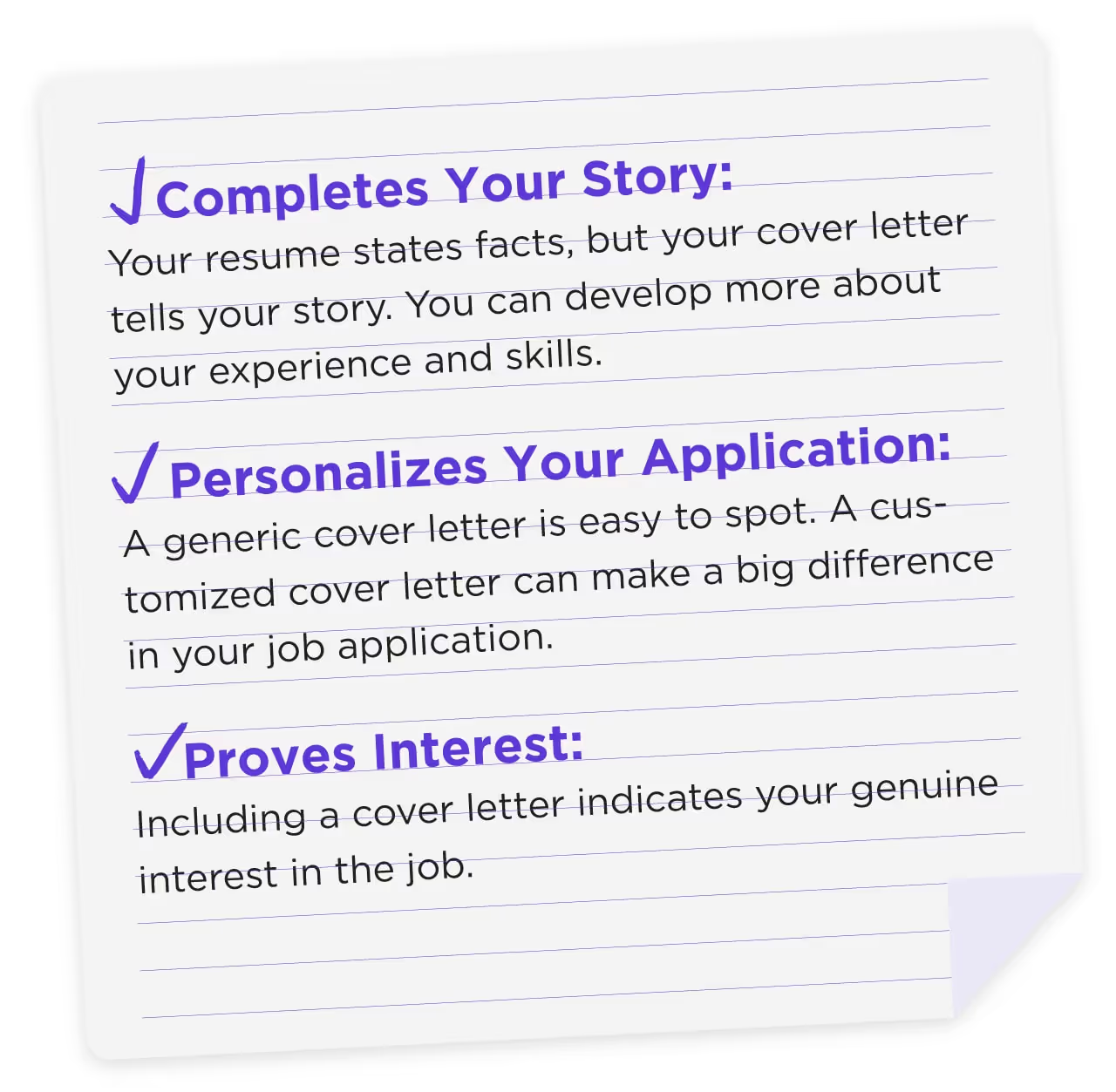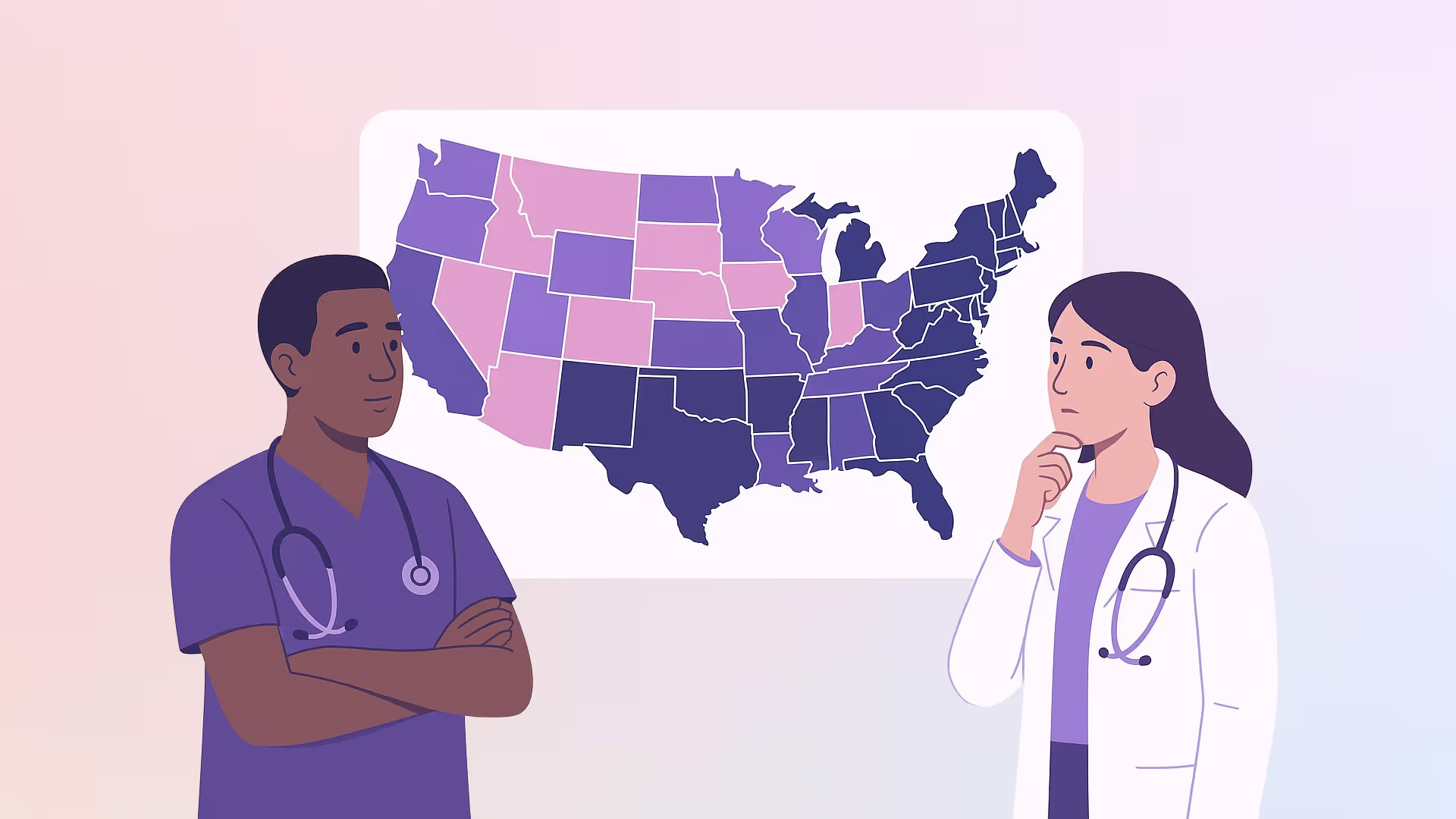A nurse practitioner cover letter is a one-page introduction that helps an employer understand not just your credentials, but your clinical judgment, professional values, and the kind of provider you are becoming. Unlike a resume, it gives you space to explain context, clarify career shifts, and connect your experience to the specific role you’re considering.
TL;DR: How to Craft The Ideal Nurse Practitioner Cover Letter
- Use your cover letter to add meaning to your resume. Your resume lists your roles and credentials. Your cover letter explains how those experiences shaped you as a clinician and why they matter for this specific position.
- Personalize it to the role. Referencing the organization and aligning your experience with their needs shows that you are applying intentionally, not broadly.
- Address transitions with clarity. If you are a new grad, changing specialties, or returning after a pause, your cover letter gives you space to explain your path confidently and professionally.
- Highlight how you practice. Beyond certifications and hours, briefly show your clinical judgment, communication style, and approach to patient care.
- Keep it concise and focused. A thoughtful, one-page letter that clearly connects your background to the role makes it easier for hiring managers to see your fit.
Why Every Nurse Practitioner Needs a Standout Cover Letter
Whether you’re a recent graduate entering the workforce or an experienced nurse practitioner (NP) seeking new opportunities, crafting the perfect cover letter can be a daunting task.
However this comprehensive guide will walk you through the steps necessary to create a cover letter that stands out and secures you the interviews you desire.
While having an impressive resume is crucial, a strong nurse practitioner cover letter can be the key factor that sets you apart from other job applicants.
Your cover letter is your personal introduction—a chance to make a lasting impression on potential employers and secure that critical job interview by addressing the hiring manager's specific needs and expectations.
Let’s explore the significance of a nurse practitioner cover letter and learn how to craft a powerful one that showcases your qualifications, enthusiasm, and suitability for the role.
What is a Nurse Practitioner Cover Letter?
Nurse practitioner cover letters serve as your introduction to a potential employer and highlight the unique qualifications and responsibilities of nurse practitioners.
They highlight your qualifications and demonstrate why you are the best candidate for the job. Unlike a resume, which lists your skills and experience in a structured format, the cover letter offers a more personal touch.
It allows you to convey your passion for the role, explain why you are interested in the position, and set the tone for the employer to get to know you better.
Is It Necessary to Write a Cover Letter?
If you are applying for a nurse practitioner position, you may be wondering whether a nurse practitioner cover letter is still necessary. Some application portals do not require one, and when your time is limited, it makes sense to be thoughtful about where you invest your energy.
In many cases, submitting a well written cover letter alongside your resume helps a hiring manager understand more than your credentials. A nurse practitioner cover letter gives you space to describe your clinical expertise, patient centered care philosophy, and commitment to improving health outcomes.
Including a compelling cover letter can be especially helpful if you are applying for a:
- Family nurse practitioner position in primary care settings
- Pediatric nurse practitioner position serving young patients
- Geriatric nurse practitioner position caring for elderly patients
- Psychiatric nurse practitioner role supporting patients with chronic conditions
- Nurse practitioner position focused on chronic disease management or preventive care
Your resume may list your certifications, clinical skills, and experience treating patients. Your cover letter explains how you provide comprehensive care, develop treatment plans, collaborate with other healthcare professionals, and improve patient outcomes.
There are situations where the impact may be smaller. If an employer relies heavily on automated systems and structured forms, you might choose to prioritize tailoring your resume and documenting your clinical expertise clearly.
The goal is not perfection. The goal is alignment. A practitioner cover letter should feel intentional and reflective of the kind of high quality care you aim to provide.
Takeaway: A nurse practitioner cover letter often strengthens your application by helping the hiring manager see how your clinical skills, patient care experience, and commitment to healthcare outcomes align with the specific nurse practitioner position you are pursuing.
The Importance of a Well-Written Nurse Practitioner Cover Letter

A nurse practitioner's cover letter is more than just a formality. It serves several critical functions in the job application process:
- Personalization: Your cover letter gives you the opportunity to personalize your application, showing that you have researched the role and the organization. This demonstrates to the employer that you are genuinely interested in the position and not just sending out a generic application.
- Showcasing Skills and Experience: While your resume lists your qualifications, your cover letter allows you to elaborate on how your skills and experience make you an ideal fit for the specific role. You can provide examples of how you have successfully applied your clinical skills in previous positions, thereby making a stronger case for your candidacy. Highlighting your commitment to exceptional patient care can further emphasize your alignment with the high standards expected in the role.
- Demonstrating Communication Skills: As a nurse practitioner, communication is a key component of your role. A well-written cover letter demonstrates your ability to communicate effectively, which is a critical skill in healthcare settings.
- Addressing Potential Concerns: If you have any gaps in your employment history, are transitioning from another field, or have other potential red flags on your resume, the cover letter is your opportunity to address these issues head-on. You can explain your situation in a positive light and provide context that might not be apparent from your resume alone.
- Setting the Tone: The cover letter sets the tone for your application and introduces you to the employer. It’s your chance to make a strong first impression and convey your enthusiasm for the role.
The Must-Have Components of an NP Cover Letter
A well written nurse practitioner cover letter should be clear, focused, and aligned with the nurse practitioner position you are pursuing. It needs to help the hiring manager understand your clinical expertise and how you provide patient care:
- Professional Greeting and Position Alignment
Address the hiring manager by name when possible and clearly state the nurse practitioner position you are applying for, such as a family nurse practitioner position, pediatric nurse practitioner position, or psychiatric nurse practitioner role. This establishes professionalism and intention from the beginning. - Clinical Skills and Patient Care Experience
Highlight your strong clinical skills, experience treating diverse patient populations, and areas such as chronic disease management, preventive care, or patient education. If relevant, briefly mention experience in primary care settings, comprehensive care, or collaborating with other healthcare professionals. This section should help the reader understand how your clinical expertise contributes to patient outcomes and quality healthcare delivery. - Commitment to Patient Centered Care
Describe how you approach patient assessment, treatment plans, and empowering patients. You may reference improving health outcomes, supporting underserved populations, or contributing to reduced hospital readmissions. Employers are evaluating how you think and practice, not just what you have done. - Professional Closing
End with appreciation and openness to further discussion. A steady, well crafted cover letter reinforces leadership skills and readiness for the nurse practitioner position without overstatement.
Pro Tip: Customize your cover letter for each job application to show that you’ve done your homework on the company and role. This personalized approach can significantly increase your chances of being noticed by hiring managers.
Step-by-Step Guide to Writing Your Nurse Practitioner Cover Letter
- Address the Hiring Manager: Always address your cover letter to a specific individual. If the job listing does not include a name, try to find the hiring manager’s name through the company’s website, LinkedIn, or by calling the company. Avoid generic salutations like “To Whom It May Concern,” which can come across as impersonal.
- Introduce Yourself: Briefly state your background, including your qualifications, and explain why you are interested in the position. This is your opportunity to make a strong first impression, so be concise but impactful.
- Showcase Your Skills: Use bullet points or short paragraphs to highlight your skills and achievements, particularly those that have led to improved patient outcomes. Make sure to tailor these to the job description, demonstrating how your experience aligns with the needs of the employer.
For example, if the job posting emphasizes the importance of patient care and leadership, highlight your experience in these areas. Create and communicate individualized treatment plans for patients, emphasizing your role in providing quality care and patient education to improve health outcomes. - Explain Your Fit: Discuss why you are the perfect candidate for the role. This is your chance to go beyond the resume and explain why you are passionate about the position and how your career goals align with the organization’s mission and values.
- Close Strong: End with a call to action, such as asking for an interview or directing the reader to your portfolio or LinkedIn profile. Be sure to express your enthusiasm for the opportunity and your eagerness to discuss how you can contribute to the team.
Action Item: Use this guide as a template to build your tailored cover letter. Remember, personalization is key to making a strong impression.
If you're putting this much energy into your cover letter, don’t waste it on a job board that treats you like just another checkbox. At NPHire, we match your unique NP skills, experience level, and career goals with jobs that actually fit. Whether you're a fresh FNP or a seasoned psych NP, we’ll help you find openings where your cover letter won’t get ghosted. Sign up free here and get early access to jobs from employers who actually get what you do.
Sample Nurse Practitioner Cover Letter
Here’s an example of a nurse practitioner cover letter that follows the steps outlined above:
Mallory Pineda
City, State, Zip Code
Home: 000-000-0000
Cell: 000-000-0000
email@email.com
Dear Dr. Mann,
I was excited to learn about the Family Nurse Practitioner position at your Family Medicine Practice. With four years of experience as a nurse practitioner at Dr. Salazar’s office, coupled with my board certification and active NP license, I am confident in my ability to contribute effectively to your team.
My experience has equipped me with a deep understanding of disease pathology, chronic disease management, and the common illnesses that patients encounter. I pride myself on having an excellent bedside manner, which allows me to assess patient needs accurately and select the appropriate prescriptions to address their conditions. Additionally, I have extensive experience in gathering and analyzing patients’ medical histories to inform diagnosis and treatment plans. In a busy family practice like yours, I understand the importance of working independently with minimal supervision, allowing you to focus on more acute medical needs.
I am passionate about delivering high-quality patient care and have successfully supervised other nurses and medical staff to ensure a smooth and effective healthcare environment. My strong problem-solving abilities and communication skills enable me to make patients feel comfortable and supported during their treatment. I am confident that, as your new Family Nurse Practitioner, I would be a valuable addition to your team.
I would love the opportunity to discuss how my skills and experience align with your needs. I can be reached after 5 PM at your convenience to schedule an interview. Please find my resume and credentials attached for your review.
Thank you for considering my application. I look forward to the possibility of contributing to your practice.
Sincerely,
Mallory Pineda
Common Mistakes to Avoid
When crafting your nurse practitioner cover letter, be mindful of the following common mistakes:
- Being too generic: Avoid using a one-size-fits-all cover letter. Each cover letter should be tailored to the specific job and institution, demonstrating your ability to provide care to a diverse patient population. This shows that you are genuinely interested in the role and have taken the time to research the company. Referring to a cover letter example can help you structure your letter effectively and avoid common pitfalls.
- Ignoring the details: Typos, grammatical errors, and incorrect information can undermine your application. Proofread your cover letter carefully, and consider having a colleague or mentor review it as well.
- Overconfidence or underconfidence: Striking the right balance between confidence and humility is crucial. While you should highlight your achievements, avoid coming across as arrogant. Conversely, don’t downplay your skills or experience.
- Neglecting the follow-up: After submitting your application, consider following up with the employer if you haven’t heard back within a reasonable timeframe. A polite follow-up email can reiterate your interest in the position and keep your application top of mind.
- Forgetting to include relevant information: Ensure that all necessary information is included, such as your contact details, the specific position you are applying for, and any requested documentation.
Cover Letter Tips for New Grad NPs
New grad? If you’re questioning whether you have enough experience to apply for a nurse practitioner position, that hesitation is common. Transitioning from registered nurse to nurse practitioner is a significant professional shift.
Your NP license may be new, but your clinical foundation is not. Your clinical rotations, RN experience, and classroom leadership all contribute to your readiness. A nurse practitioner cover letter is where you connect those experiences and show how they translate into patient care.
How to position yourself as a new grad:
- Lead with your commitment to patient care. Employers understand you are early in your nurse practitioner career. What they look for is professionalism, coachability, and dedication to providing exceptional patient care.
- Highlight your clinical rotations. Reference preceptor feedback, hands-on experience, and population-specific exposure such as pediatric care, geriatric care, psychiatric care, or primary care services. This demonstrates applied clinical skills and real-world preparation.
- Connect your RN background. Your experience as a registered nurse strengthens your patient assessment, clinical judgment, and ability to manage diverse patient populations.
- Emphasize skills that improve patient outcomes. Communication, collaboration with other healthcare professionals, patient education, and time management directly impact healthcare outcomes.
Example opening line:
“As a recent Family Nurse Practitioner graduate with six years of RN experience in primary care settings, I bring a strong foundation in patient centered care, chronic disease management, and preventive care.”
You do not need years of independent practice to write a compelling cover letter. You need clarity about how your experience supports high quality care and improving health outcomes.
If you’re searching for nurse practitioner positions that welcome new graduates, consider focusing on employers who value structured onboarding and mentorship. At NPHire, we spotlight nurse practitioner roles that are open to new grads and committed to thoughtful hiring. You can explore available opportunities and decide which positions align with your goals and preferred practice setting.
As a new grad nurse practitioner, your cover letter should confidently connect your RN experience, clinical training, and commitment to patient centered care with the nurse practitioner position you are pursuing.
When & How to Mention Career Gaps, Shifts (or Burnout Recovery)
Life happens. You may have taken time away for family, a relocation, personal health, or to recover from burnout after years in demanding primary care settings. A nurse practitioner cover letter gives you space to acknowledge that transition with professionalism and clarity.
You do not need to provide a detailed explanation. A brief, steady sentence is often enough.
Here’s how to approach it:
- Acknowledge it concisely.
One sentence such as, “Following a career pause to focus on family responsibilities,” or “After stepping away to address personal well-being,” provides context without oversharing. - Reframe with professional growth.
Highlight what strengthened during that time. This may include continuing education, advanced certifications, leadership development, or renewed commitment to patient centered care. If relevant, reference how you deepened your understanding of chronic conditions, preventive care, or improving health outcomes. - Emphasize readiness and alignment.
Briefly explain why you are returning to practice and what draws you to this nurse practitioner position. This reinforces your clinical expertise and intention to provide high quality care.
Addressing a career gap directly in your practitioner cover letter often reduces uncertainty later in the hiring process. When you articulate your path clearly, you enter interviews feeling prepared rather than reactive.
Example line:
“After taking a year to prioritize family health, I am returning to clinical practice with renewed focus on comprehensive primary care services and a strengthened commitment to improving healthcare outcomes.”
A career pause does not diminish your qualifications. When framed thoughtfully, it can reflect maturity, self-awareness, and a deeper understanding of sustainable patient care.
When mentioning a gap in your nurse practitioner cover letter, keep it brief, professional, and focused on growth. Clear context combined with demonstrated clinical expertise helps hiring managers evaluate your readiness with confidence.
Final Thoughts
Writing a nurse practitioner cover letter can feel like one more responsibility at the end of an already demanding program. If you are finishing clinical rotations, preparing for boards, or balancing work and family responsibilities, it makes sense that this step feels heavy.
A well written nurse practitioner cover letter is not about exaggerating your experience. It is about clearly communicating your clinical expertise, your approach to patient centered care, and your readiness for the nurse practitioner position you are pursuing. When written thoughtfully, it helps hiring managers understand how your training, chronic disease management experience, and commitment to improving health outcomes translate into high quality care.
The strength of your clinical placements often shapes the confidence you bring into interviews. When your training environment has supported your growth, it becomes easier to speak clearly about patient assessment, treatment plans, and improving patient outcomes.
You’ve got this! And once you’ve landed the job, consider giving back to the community by becoming a nurse practitioner preceptor to help train and develop the next generation of NPs.
You’re ready to land the job with your cover letter, make sure you’re also ready to graduate. NPHub has helped over 10,000 NP students find vetted preceptors quickly and stress-free. Create your free account here and take the next step toward your NP career with confidence.
Frequently Asked Questions: Nurse Practitioner Cover Letters
How long should my NP cover letter be?
Ideally, your cover letter should be concise, keeping it under one page. A well-organized cover letter that gets straight to the point is more likely to hold the reader's attention.
Should I always include a cover letter with my application?
Yes, even if it's not mandatory, including a cover letter significantly boosts your chances of getting noticed. It provides additional context to your resume and demonstrates your commitment to the application process. Utilizing letter examples can also help you craft a more effective and professional cover letter.
Can I use the same cover letter for multiple job applications?
It's crucial to tailor your cover letter to each specific job and institution. While you can reuse certain elements, each cover letter should be customized to address the unique requirements of the job posting and reflect your knowledge of the organization.
By following these guidelines and putting in the effort to personalize your cover letter, you'll be well on your way to landing the nurse practitioner role you're aiming for. Good luck!
What should I highlight in my NP cover letter that isn’t on my resume?
Use your cover letter to showcase personality, passion, and communication skills. You can also explain career gaps, transitions, or new grad status—things that aren’t easy to capture in a resume format.
How do I address my cover letter if I don’t know the hiring manager’s name?
Whenever possible, research the hiring manager’s name on the company website or LinkedIn. If unavailable, use a professional greeting like “Dear Hiring Committee” or “Dear Nurse Recruitment Team” instead of the generic “To Whom It May Concern.”
What mistakes should I avoid in an NP cover letter?
Avoid being too generic, repeating your resume word-for-word, or making it overly long. Typos, grammatical errors, or addressing the wrong organization are also common deal-breakers for employers.
Should new grad NPs write cover letters differently?
Yes—new grads should emphasize clinical rotations, preceptor feedback, and RN experience. Highlighting soft skills like communication, time management, and adaptability also helps bridge the gap when direct NP experience is limited.
How can I explain a career gap in my NP cover letter?
Acknowledge the gap briefly, reframe it with any personal growth or certifications earned during that time, and return the focus to how ready and motivated you are to re-enter practice. Keep it confident and forward-looking.
Do employers actually read NP cover letters?
Yes—many hiring managers use cover letters to evaluate communication skills, professionalism, and fit for the organization. Even if they skim, a strong opening and clear alignment with the role can make you stand out.
What’s the best way to close an NP cover letter?
End with a confident call to action, such as requesting an interview or inviting the hiring manager to review your attached resume and credentials. Always thank them for their time and express genuine enthusiasm for the role.
About the author
- NPHub Staff
At NPHub, we live and breathe clinical placements. Our team is made up of nurse practitioners, clinical coordinators, placement advisors, and former students who’ve been through the process themselves. We work directly with NP students across the country to help them secure high-quality preceptorships and graduate on time with confidence. - Last updated
Feb 23, 2026 - Fact-checked by
NPHub Clinical Placement Experts & Student Support Team - Sources and references
Find a preceptor who cares with NPHub
Book a rotation.webp)








.webp)


.webp)



%20(3)%20(2).svg)
.webp)